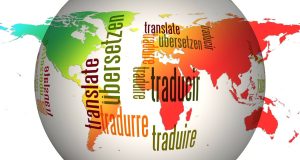Translation friendly writing
 We live in a multilingual world. Some countries, such as Canada, Belgium, and Switzerland, have more than one official language, meaning that their governments have an obligation to provide many texts in all the official languages of that country. In other regions, groups of countries have decided to cooperate to develop various types of agreements to facilitate trade, immigration and travel. The European Union is a good example of a group of independent nations working together to achieve common goals, and translation plays an important role in enabling them to communicate with one another. Even when there is no formal obligation for translation, there are many reasons why it makes sense to provide information in more than one language. Sometimes it might be for business reasons (for example, to increase sales), but other times it might simply be because it’s kind or helpful to do so!
We live in a multilingual world. Some countries, such as Canada, Belgium, and Switzerland, have more than one official language, meaning that their governments have an obligation to provide many texts in all the official languages of that country. In other regions, groups of countries have decided to cooperate to develop various types of agreements to facilitate trade, immigration and travel. The European Union is a good example of a group of independent nations working together to achieve common goals, and translation plays an important role in enabling them to communicate with one another. Even when there is no formal obligation for translation, there are many reasons why it makes sense to provide information in more than one language. Sometimes it might be for business reasons (for example, to increase sales), but other times it might simply be because it’s kind or helpful to do so!
This OER seeks to raise awareness about the “garbage in, garbage out” phenomenon as it applies to writing for translation, and to provide some practical tips to help you improve your writing so that you or your readers can also obtain better translations. Remember that when creating a translation friendly text, the overall goal is to write clearly and unambiguously, so take the time to plan your text before you begin writing, and also to proofread your text carefully once it has been written.
Because every language has different features, there may be some structures that are problematic for certain languages but not for others. This OER focuses on providing tips that are not language specific and that could be helpful regardless of which language you are writing in.
Find out more
Some of the tips provided in the following sections have been inspired by brochures produced by the Translation Centre for the Bodies of the European Union, which can be freely downloaded from their website:
You can also consult:
- How to Write for Machine Translation (KantanAI blog)
- Writing for Machine Translation (Isabella Massardo’s blog)

